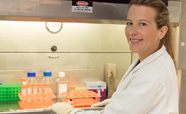 Research Fellow
Research Fellow
BBiomedSc(Hons), PhD (Otago)
Research interests
My research interests lie at the intersection of inflammation, ageing, cancer, and epigenetics. By investigating the dynamic changes in epigenetic regulation associated with inflammation-induced carcinogenesis and ageing, my aim is to identify novel therapeutic targets and interventions to improve outcomes in cancer and age-related disorders.
I am particularly interested in how immune cell- and mitochondria-derived oxidants influence the enzymes involved in DNA methylation. We have shown that exposure to oxidants such as hydrogen peroxide (H₂O₂) and glycine chloramine can inactivate DNA methyltransferase (DNMT) activity through direct inhibition and depletion of S-adenosyl methionine (SAM). This leads to site-specific changes in DNA methylation and corresponding transcriptional changes in T-lymphoma cells—many of which are associated with key cancer pathways, including proliferation, differentiation, autophagy, and apoptosis.
My current work is investigating how mitochondrial dysfunction shapes the epigenetic landscape and differentiation of haematopoietic stem cells, with implications for ageing, haematological disease, and cancer. As part of this, my Cancer Society-funded postdoctoral fellowship focuses on acute myeloid leukaemia (AML)—an aggressive blood cancer with poor survival rates, particularly in older adults. This project examines how mitochondrial stress alters DNA methylation and contributes to disease development, and how mitochondria-targeted therapies might improve responses to existing lower-intensity treatments.
In parallel, I am working with the Canterbury Health, Ageing and Life course (CHALICE) study, which aims to identify early immune and metabolic markers of age-related decline in a large local cohort. This work, generously funded by the Canterbury Medical Research Foundation, aims to uncover early indicators of disease risk and inform strategies for prevention and early intervention.
In ongoing work, I’m exploring how certain bacterial lipopolysaccharides (LPS) —found in abundance in the gut of patients with colorectal cancer—affect immune cell oxidant release and epigenetic regulation in this cancer.
I welcome enquiries from highly motivated postgraduate and medical students with a genuine interest in these research areas.
1. Das, A. B., Seddon A.R. et al. Free Radic. Biol. Med. 170, 131–149 (2021)
2. Seddon, A. R. et al. Epigenetics and Chromatin 14, 1–16 (2021)
3. Seddon, A. R. et al. Hum. Mol. Genet. 00, 1–17 (2022)
Publications
Damiano, O. M., Stevens, A. J., Kenwright, D. N., & Seddon, A. R. (2025). Chronic inflammation to cancer: The impact of oxidative stress on DNA methylation. Frontiers in Bioscience - Landmark, 30(3), 26142. doi: 10.31083/fbl26142 Journal - Research Other
Seddon, A. R., MacArthur, C. P., Hampton, M. B., & Stevens, A. J. (2024). Inflammation and DNA methylation in Alzheimer’s disease: Mechanisms of epigenetic remodelling by immune cell oxidants in the ageing brain. Redox Report, 29(1), 2428152. doi: 10.1080/13510002.2024.2428152 Journal - Research Other
Damiano, O. M., Stevens, A. J., Seddon, A. R., & Chatterjee, A. (2024). Altered DNA methylation patterns in colorectal cancer associated with immune cell oxidants. Proceedings of the 17th GeneMappers Conference. Retrieved from https://www.genemappersconference.org Conference Contribution - Published proceedings: Abstract
Stevens, A., Seddon, A., Hampton, M., & Andrew, D. (2024). Oxidative stress induced changes in DNA methylation. Proceedings of the 17th GeneMappers Conference. Retrieved from https://www.genemappersconference.org Conference Contribution - Published proceedings: Abstract
Seddon, A. R., Damiano, O., Hampton, M. B., & Stevens, A. J. (2024). Widespread genomic de novo DNA methylation occurs following CD8+ T cell activation and proliferation. Epigenetics, 19(1), 2367385. doi: 10.1080/15592294.2024.2367385 Journal - Research Article
